Fleurs du Mal Magazine


Or see the index
Under a Future Sky is a gathering of generations, a performance with ghosts anchored in Brynn Saito’s journey with her father to the desert prison where, over 80 years ago, her grandparents met and made a life.
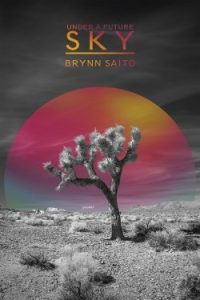 Born of a personal ache, an unquenchable desire to animate the shadow archive, Saito’s journey unfolds in lyric correspondences and epistolary poems that sing with rage, confusion, and, ultimately, love. In these works, descendants of wartime incarceration exchange dreams, mothers become water goddesses, and a modern daughter haunts future ruins. To enter this book is to enter the slipstream of nonlinear time, where mystical inclinations, yellow cedars, and sisterhood make a balm for trauma’s scars. Altogether, the work enacts a dialogue between the past and the present; the radical ancestor and the future child; and the desert prison and the family garden, where Saito’s father diligently gathers stones.
Born of a personal ache, an unquenchable desire to animate the shadow archive, Saito’s journey unfolds in lyric correspondences and epistolary poems that sing with rage, confusion, and, ultimately, love. In these works, descendants of wartime incarceration exchange dreams, mothers become water goddesses, and a modern daughter haunts future ruins. To enter this book is to enter the slipstream of nonlinear time, where mystical inclinations, yellow cedars, and sisterhood make a balm for trauma’s scars. Altogether, the work enacts a dialogue between the past and the present; the radical ancestor and the future child; and the desert prison and the family garden, where Saito’s father diligently gathers stones.
Brynn Saito is the author of Power Made Us Swoon (2016) and The Palace of Contemplating Departure (2013), winner of the Benjamin Saltman Poetry Award from Red Hen Press and a finalist for the Northern California Book Award. She has received grant support from Densho, Hedgebrook, and the Santa Fe Arts Institute. Her poems have appeared in the New York Times and American Review among other journals and anthologies. She was a finalist for the Paterson Poetry Prize and the Milt Kessler Poetry Book Award. Brynn lives in Fresno, CA, where she is an Assistant Professor at California State University, Fresno and co-director of Yonsei Memory Project.
Brynn teaches in the MFA program at California State University, Fresno. She’s co-editing with Brandon Shimoda an anthology of poetry written by descendants of the Japanese American / Nikkei incarceration, forthcoming in 2025 from Haymarket Books.
Under a Future Sky
by Brynn Saito
112 pages
August 15, 2023
ISBN-13 978-1636281070
Publisher: Red Hen Press
Hardcover
€20,99
•fleursdumal.nl magazine
More in: #Editors Choice Archiv, *War Poetry Archive, - Book News, - Bookstores, Archive S-T, Archive S-T, Racism
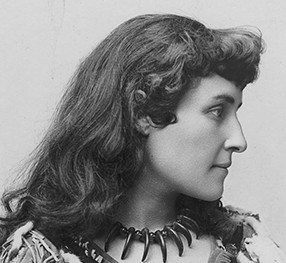
A Cry from an Indian Wife
My Forest Brave, my Red-skin love, farewell;
We may not meet to-morrow; who can tell
What mighty ills befall our little band,
Or what you’ll suffer from the white man’s hand?
Here is your knife! I thought ’twas sheathed for aye.
No roaming bison calls for it to-day;
No hide of prairie cattle will it maim;
The plains are bare, it seeks a nobler game:
’Twill drink the life-blood of a soldier host.
Go; rise and strike, no matter what the cost.
Yet stay. Revolt not at the Union Jack,
Nor raise Thy hand against this stripling pack
Of white-faced warriors, marching West to quell
Our fallen tribe that rises to rebel.
They all are young and beautiful and good;
Curse to the war that drinks their harmless blood.
Curse to the fate that brought them from the East
To be our chiefs—to make our nation least
That breathes the air of this vast continent.
Still their new rule and council is well meant.
They but forget we Indians owned the land
From ocean unto ocean; that they stand
Upon a soil that centuries agone
Was our sole kingdom and our right alone.
They never think how they would feel to-day,
If some great nation came from far away,
Wresting their country from their hapless braves,
Giving what they gave us—but wars and graves.
Then go and strike for liberty and life,
And bring back honour to your Indian wife.
Your wife? Ah, what of that, who cares for me?
Who pities my poor love and agony?
What white-robed priest prays for your safety here,
As prayer is said for every volunteer
That swells the ranks that Canada sends out?
Who prays for vict’ry for the Indian scout?
Who prays for our poor nation lying low?
None—therefore take your tomahawk and go.
My heart may break and burn into its core,
But I am strong to bid you go to war.
Yet stay, my heart is not the only one
That grieves the loss of husband and of son;
Think of the mothers o’er the inland seas;
Think of the pale-faced maiden on her knees;
One pleads her God to guard some sweet-faced child
That marches on toward the North-West wild.
The other prays to shield her love from harm,
To strengthen his young, proud uplifted arm.
Ah, how her white face quivers thus to think,
Your tomahawk his life’s best blood will drink.
She never thinks of my wild aching breast,
Nor prays for your dark face and eagle crest
Endangered by a thousand rifle balls,
My heart the target if my warrior falls.
O! coward self I hesitate no more;
Go forth, and win the glories of the war.
Go forth, nor bend to greed of white men’s hands,
By right, by birth we Indians own these lands,
Though starved, crushed, plundered, lies our nation low . . .
Perhaps the white man’s God has willed it so.
Emily Pauline Johnson
(1861 – 1913)
A Cry from an Indian Wife
Poem
• fleursdumal.nl magazine
More in: # Classic Poetry Archive, *Archive Native American Literature, Archive I-J, Archive I-J, Emily Pauline Johnson, Racism

Song of the American Indian
Stranger, stay, nor wish to climb
The heights of yonder hills sublime;
For there strange shapes and spirits dwell,
That oft the murmuring thunders swell,
Of power from the impending steep
To hurl thee headlong to the deep;
But secure with us abide,
By the winding river’s side;
Our gladsome toil, our pleasures share,
And think not of a world of care.
The lonely cayman, where he feeds
Among the green high-bending reeds,
Shall yield thee pastime; thy keen dart
Through his bright scales shall pierce his heart.
Home returning from our toils,
Thou shalt bear the tiger’s spoils;
And we will sing our loudest strain
O’er the forest-tyrant slain!
Sometimes thou shalt pause to hear
The beauteous cardinal sing clear;
Where hoary oaks, by time decayed,
Nod in the deep wood’s pathless glade;
And the sun, with bursting ray,
Quivers on the branches gray.
By the river’s craggy banks,
O’erhung with stately cypress-ranks,
Where the bush-bee hums his song,
Thy trim canoe shall glance along.
To-night at least, in this retreat,
Stranger! rest thy wandering feet;
To-morrow, with unerring bow,
To the deep thickets fearless we will go.
William Lisle Bowles
(1762 – 1850)
Song of the American Indian
• fleursdumal.nl magazine
More in: # Classic Poetry Archive, #Archive Native American Library, Archive A-B, Archive A-B, Cowboys and Indians, Racism, Western Fiction

The Dying Slave
Faint-gazing on the burning orb of day,
When Afric’s injured son expiring lay,
His forehead cold, his labouring bosom bare,
His dewy temples, and his sable hair,
His poor companions kissed, and cried aloud,
Rejoicing, whilst his head in peace he bowed:—
Now thy long, long task is done,
Swiftly, brother, wilt thou run,
Ere to-morrow’s golden beam
Glitter on thy parent stream,
Swiftly the delights to share,
The feast of joy that waits thee there.
Swiftly, brother, wilt thou ride
O’er the long and stormy tide,
Fleeter than the hurricane,
Till thou see’st those scenes again,
Where thy father’s hut was reared,
Where thy mother’s voice was heard;
Where thy infant brothers played
Beneath the fragrant citron shade;
Where through green savannahs wide
Cooling rivers silent glide,
Or the shrill cicalas sing
Ceaseless to their murmuring;
Where the dance, the festive song,
Of many a friend divided long,
Doomed through stranger lands to roam,
Shall bid thy spirit welcome home!
Fearless o’er the foaming tide
Again thy light canoe shall ride;
Fearless on the embattled plain
Thou shalt lift thy lance again;
Or, starting at the call of morn,
Wake the wild woods with thy horn;
Or, rushing down the mountain-slope,
O’ertake the nimble antelope;
Or lead the dance, ‘mid blissful bands,
On cool Andracte’s yellow sands;
Or, in the embowering orange-grove,
Tell to thy long-forsaken love
The wounds, the agony severe,
Thy patient spirit suffered here!
Fear not now the tyrant’s power,
Past is his insulting hour;
Mark no more the sullen trait
On slavery’s brow of scorn and hate;
Hear no more the long sigh borne
Murmuring on the gales of morn!
Go in peace; yet we remain
Far distant toiling on in pain;
Ere the great Sun fire the skies
To our work of woe we rise;
And see each night, without a friend,
The world’s great comforter descend!
Tell our brethren, where ye meet,
Thus we toil with weary feet;
Yet tell them that Love’s generous flame,
In joy, in wretchedness the same,
In distant worlds was ne’er forgot;
And tell them that we murmur not;
Tell them, though the pang will start,
And drain the life-blood from the heart,—
Tell them, generous shame forbids
The tear to stain our burning lids!
Tell them, in weariness and want,
For our native hills we pant,
Where soon, from shame and sorrow free,
We hope in death to follow thee!
William Lisle Bowles
(1762 – 1850)
The Dying Slave
• fleursdumal.nl magazine
More in: # Classic Poetry Archive, *Archive African American Literature, Archive A-B, Archive A-B, Black Lives Matter, Racism
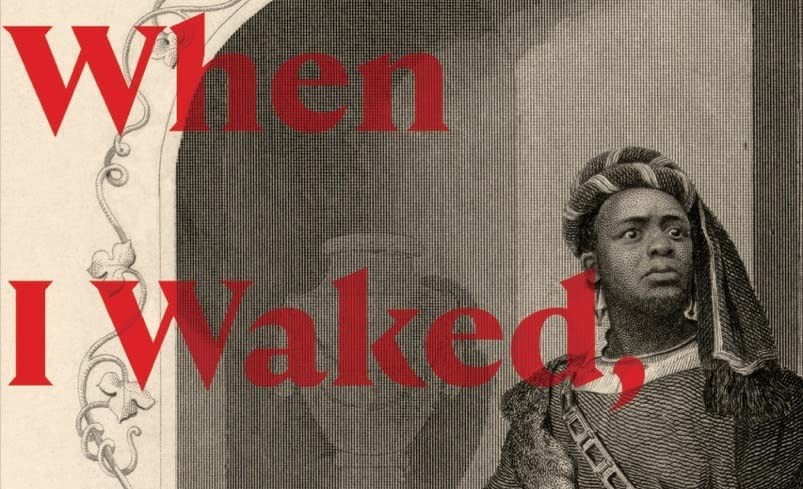
A dynamic, moving hybrid work that celebrates Black youth, often too fleeting, and examines Black lives lost to police violence.
In this astonishing volume of poems and lyric prose, Whiting Award–winner A. Van Jordan draws comparisons to Black characters in Shakespearean plays―Caliban and Sycorax from?The Tempest, Aaron the Moor from?Titus Andronicus, and the eponymous antihero of? Othello―to mourn the deaths of Black people, particularly Black children, at the hands of police officers. What do these characters, and the ways they are defined by the white figures who surround them, have in common with Tamir Rice, Trayvon Martin, and other Black people killed in the twenty-first century?
Balancing anger and grief with celebration, Jordan employs an elastic variety of poetic forms, including ekphrastic sestinas inspired by the photography of Malick Sidibé, fictional dialogues, and his signature definition poems that break down the insidious power of words like “fair,” “suspect,” and “juvenile.” He invents a new form of window poems, based on a characterization exercise, to see Shakespeare’s Black characters in three dimensions, and finds contemporary parallels in the way these characters are othered, rendered at once undesirable and hypersexualized, a threat and a joke.
At once a stunning inquiry into the roots of racist violence and a moving recognition of the joy of Black youth before the world takes hold, When I Waked, I Cried to Dream Again expresses the preciousness and precarity of life.
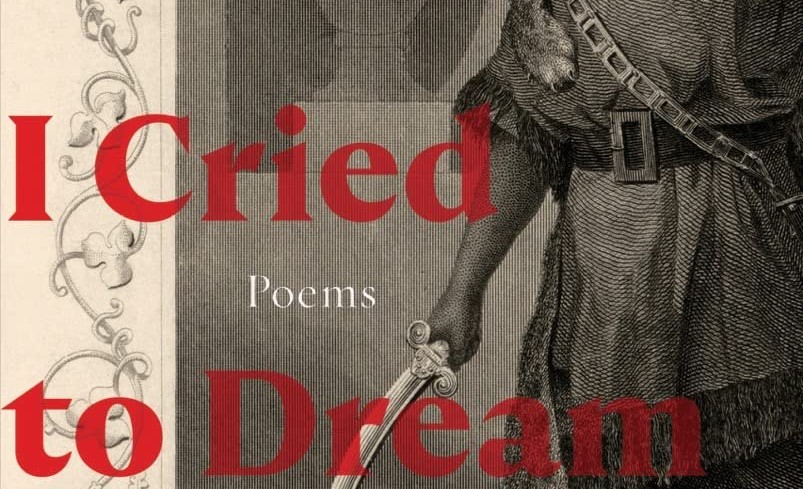
A. Van Jordan is the author of four collections: Rise, which won the PEN/Oakland Josephine Miles Award (Tia Chucha Press, 2001); M-A-C-N-O-L-I-A, (2005), which was listed as one the Best Books of 2005 by The London Times; Quantum Lyrics, (2007); and The Cineaste, (2013), W.W. Norton & Co. Jordan has been awarded a Whiting Writers Award, an Anisfield-Wolf Book Award, and a Pushcart Prize. He is also a recipient of a Guggenheim Fellowship (2007), a United States Artists Fellowship (2009), and a Lannan Literary Award in Poetry (2015).
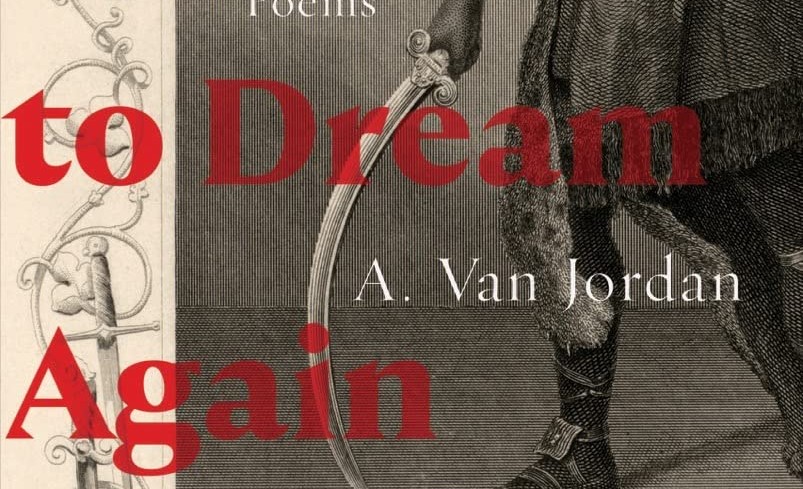
When I Waked, I Cried To Dream Again:
Poems by A. Van Jordan
Publisher: W. W. Norton & Company (June 6, 2023)
Language: English
Hardcover
144 pages
ISBN-10 : 1324050934
ISBN-13 : 978-1324050933
Price $26.95
fleursdumal.nl magazine
More in: #Modern Poetry Archive, - Book News, - Bookstores, Archive I-J, Archive I-J, Racism
This keenly anticipated new collection from the Costa Poetry Award-winner speaks ‘out of fear and grief into splendour and joy’.
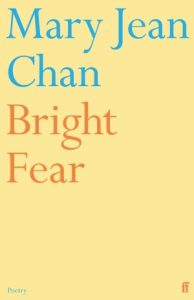 Following their award-winning debut, Flèche (2019), comes Mary Jean Chan’s gleaming second collection: Bright Fear. Through poems which engage fearlessly with intertwined themes of identity, multilingualism and postcolonial legacy, Chan’s latest work explores a family’s evolving dynamics, as well as microaggressions stemming from queerphobia and anti-Asian racism that accompanied the Covid pandemic.
Following their award-winning debut, Flèche (2019), comes Mary Jean Chan’s gleaming second collection: Bright Fear. Through poems which engage fearlessly with intertwined themes of identity, multilingualism and postcolonial legacy, Chan’s latest work explores a family’s evolving dynamics, as well as microaggressions stemming from queerphobia and anti-Asian racism that accompanied the Covid pandemic.
Yet Bright Fear remains deeply attuned to moments of beauty, tenderness and grace. It asks how we might find a home within our own bodies, in places both distant and near, and in the ‘constructed space’ of the poem. The contemplative central sequence, Ars Poetica, traces the radically healing and transformative role of poetry during the poet’s teenage and adult years, culminating in a polyphonic reconciliation of tongues. Throughout, Chan offers us new and galvanising ways to ‘withstand the quotidian tug- / of-war between terror and love’.
Mary Jean Chan is the author of Flèche (Faber, 2019), which won the Costa Book Award for Poetry and was shortlisted for the International Dylan Thomas Prize, the John Pollard Foundation International Poetry Prize, the Jhalak Prize, the Seamus Heaney Centre First Collection Poetry Prize and a Lambda Literary Award. Chan won the 2018 Geoffrey Dearmer Prize and was shortlisted for the Forward Prize for Best Single Poem in 2017 and 2019, receiving an Eric Gregory Award in 2019. Chan co-edited the anthology 100 Queer Poems (Vintage, 2022) with Andrew McMillan, and is a judge for the 2023 Booker Prize. Born and raised in Hong Kong, Chan serves as Senior Lecturer in Creative Writing (Poetry) at Oxford Brookes University and lives in Oxford.
Most mornings, you see the face
of a boy in the mirror. You
expect to fall in love with him,
someday. Meanwhile, your fingers
brush the wrist of another girl as
you jostle into the assembly hall,
and you understand that sin was
never meant to be easy, only
sweet. What might light up the
pond you sat beside in dreams,
eyeing skin and so much depth it
would be years before you dared?
What curvature of tongue might
you taste, as if another’s breath
were blessing? One night, you find
yourself back there. You dream.
A voice says: Hell is not other
people. You sink, stripped of the
glowing dress you wore for
thousands of days.
(fragment poem)
Bright Fear
by Mary Jean Chan
(Poems)
Publisher: Faber & Faber;
Main edition
3 August 2023
Language: English
ISBN-10: 0571378900
ISBN-13: 978-0571378906
Dimensions: 15.8 x 0.6 x 20.5 cm
Paperback
72 pages
£10.99
• fleursdumal.nl magazine
More in: #Editors Choice Archiv, - Book News, - Bookstores, Archive C-D, Archive C-D, Racism
Inspiring oral histories of women fighting for justice and radical social change at community, state, and national levels.
 Award-winning oral historian Lynn Lewis brings together the stories of nine exceptional women, from their earliest formative experiences to their current strategies as movement leaders, organizers, and cultural workers.
Award-winning oral historian Lynn Lewis brings together the stories of nine exceptional women, from their earliest formative experiences to their current strategies as movement leaders, organizers, and cultural workers.
Each chapter is dedicated to one activist—Malkia Devich-Cyril, Priscilla Gonzalez, Terese Howard, Hilary Moore, Vanessa Nosie, Roz Pelles, Loretta Ross, Yomara Velez, and Betty Yu.
Reflecting upon the path their lives have taken, they talk about their struggles and aspirations, insights and victories, and what keeps them in the fight for a better world.
The life stories of these inspiring women reveal the many ways the experience of injustice can catalyze resistance and a commitment to making change. They demonstrate how the relationships and bonds of collective struggle for the common good not only win justice, but create hope, love, and joy.
Lynn Lewis (editor) is an oral historian, educator, and community organizer. She is the author of Love and Collective Resistance: Lessons from the Picture the Homeless Oral History Project and is the former executive director and past civil rights organizer at Picture the Homeless. Lewis is the recipient of many honors and awards, including a 2022/2023 National Endowment for the Humanities Oral History Fellowship. She lives in New York City.
Women Who Change the World:
Stories from the Fight for Social Justice
by Lynn Lewis (Editor)
ISBN-13: 9780872868748
Publisher: City Lights Books
Series: City Lights Open Media
Publication date: 08/29/2023
Pages: 280
Paperback
$17.95
• fleursdumal.nl magazine
More in: - Book News, - Bookstores, Archive K-L, AUDIO, CINEMA, RADIO & TV, Black Lives Matter, Feminism, Racism, Workers of the World
Harvest Lingo is the fourteenth collection of poems by Lionel Fogarty, a Murri man with traditional connections to the Yugambeh people from south of Brisbane and the Kudjela people of north Queensland.
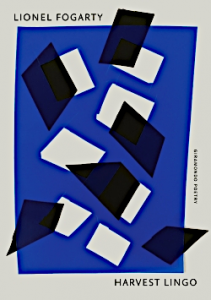 He is a leading Indigenous rights activist, and one of Australia’s foremost poets, and this collection displays all of the urgency, energy and linguistic audacity for which Fogarty is known.
He is a leading Indigenous rights activist, and one of Australia’s foremost poets, and this collection displays all of the urgency, energy and linguistic audacity for which Fogarty is known.
At the centre of the collection is a series of poems written in India. Deeply empathetic, these poems are remarkable for the connections they draw between the social problems the poet encounters in this country – poverty, class division, corruption – and those he sees in contemporary Australia, besetting his own people.
Other poems tell of encounters between people and between cultures, address historical and cultural issues and political events, and pay tribute to important Indigenous figures. There are intensely felt lyrics of personal experience, and poems which contemplate Fogarty’s own position as a poet and an activist, speaking with and for his community.
Fogarty’s poems are bold and fierce, at times challenging and confronting, moved by strong rhythms and a remarkable freedom with language. They are an expression of the ‘harvest lingo’ which gives the collection its title.
Lionel Fogarty was born on Wakka Wakka land, at Cherbourg Aboriginal Reserve in south-east Queensland in 1957. Throughout the 1970s he worked as an activist for Aboriginal Land Rights, and in the 1990s, after the death of his brother Daniel Yock, protesting against Aboriginal Deaths in Custody. His poetry collections date from the early 1980s; his most recent collections are Connection Requital; Mogwie-Idan: Stories of the Land; Eelahroo (Long Ago) Nyah (Looking) Mobo-Mobo (Future), all with Vagabond Press, and Lionel Fogarty: Selected Poems 1980-2017, published by re.press.
Harvest Lingo
by Lionel Fogarty
Poetry
Giramondo Publishing
112 pages
Paperback, 21 x 14.8 cm
Published June 2022
ISBN 9781925336177
$25,00
• fleursdumal.nl magazine
More in: #Editors Choice Archiv, - Book News, - Bookstores, Archive E-F, Archive E-F, Black Lives Matter, Racism
In this powerful collection of interviews, Noam Chomsky exposes the problems of our world today, as we stand in this period of monumental change, preparing for a more hopeful tomorrow.
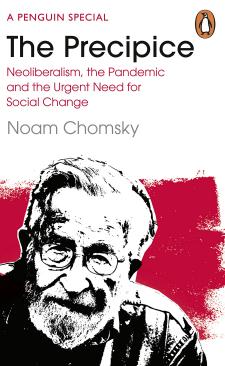 ‘For the left, elections are a brief interlude in a life of real politics, a moment to ask whether it’s worth taking time off to vote . . . Then back to work. The work will be to move forward to construct the better world that is within reach.’
‘For the left, elections are a brief interlude in a life of real politics, a moment to ask whether it’s worth taking time off to vote . . . Then back to work. The work will be to move forward to construct the better world that is within reach.’
He sheds light into the phenomenon of right-wing populism, and exposes the catastrophic nature and impact of authoritarian policies on people, the environment and the planet as a whole. He captures the dynamics of the brutal class warfare launched by the masters of capital to maintain and even enhance the features of a dog-eat-dog society. And he celebrates the recent unprecedented mobilizations of millions of people internationally against neoliberal capitalism, racism and police violence.
We stand at a precipice and we must fight to pull the world back from it.
Noam Chomsky is Institute Professor in the Department of Linguistics and Philosophy at the Massachusetts Institute of Technology, Boston. A member of the American Academy of Science, he has published widely in both linguistics and current affairs. His books include At War with Asia, Towards a New Cold War, Fateful Triangle: The U. S., Israel and the Palestinians, Necessary Illusions, Hegemony or Survival, Deterring Democracy, Failed States: The Abuse of Power and the Assault on Democracy and Manufacturing Consent: The Political Economy of the Mass Media.
C. J. Polychroniou is a regular contributor to Truthout as well as a member of Truthout’s Public Intellectual Project. He has published several books and his articles have appeared in a variety of journals, magazines, newspapers, and popular news websites.
# new books
The Precipice: Neoliberalism, the Pandemic
and the Urgent Need for Radical Change
by Noam Chomsky
and C. J. Polychroniou
Publisher : Penguin Books Ltd
June 24, 2021
Language : English
ISBN-10: 0241993938
ISBN-13: 978-0241993934
Paperback
368 pages
€ 7,99
• fleursdumal.nl magazine
More in: - Book News, - Bookstores, Archive C-D, Archive O-P, Noam Chomsky, Racism, REPRESSION OF WRITERS, JOURNALISTS & ARTISTS
BANNED BOOKS WEEK
September 26 – October 2 for the 2021
celebration of the right to read!

Across the United States, divisive book bans and censorious threats have taken hold in schools, academia, and the public square, particularly in regards to books that center racism, history, and diversity. This has raised questions: Who is allowed to be heard? Who decides? This year, as we celebrate Banned Books Week, PEN America uplifts the books, authors, teachers, and writers who insist on telling stories and examining history with truth, honesty, and complexity.
In an effort to unpack these current challenges, PEN America is hosting a series of virtual and in-person events. These events will offer a clear-eyed view of the current assaults on the freedom to express, the freedom to read, and the freedom to learn.
Join PEN America Today
Defend free expression, support persecuted writers, and promote literary culture.
Read more about what PEN America is doing to fight back against book bans during 2021 Banned Books Week.

BANNED BOOKS WEEK
September 26 – October 2 for the 2021
celebration of the right to read!
Banned Books Week is the annual celebration of the freedom to read. The event is sponsored by a coalition of organizations dedicated to free expression, including American Booksellers Association; American Library Association; American Society of Journalists and Authors; Association of University Presses; Authors Guild; Comic Book Legal Defense Fund; Foundation for Individual Rights in Education (FIRE); Freedom to Read Foundation; Index on Censorship; National Coalition Against Censorship; National Council of Teachers of English; PEN America; People For the American Way Foundation; and Project Censored. It is endorsed by the Center for the Book in the Library of Congress. Banned Books Week also receives generous support from DKT Liberty Project and Penguin Random House.
Read more about the 2021 Banned Books Week.
→ https://bannedbooksweek.org/
• fleursdumal.nl magazine
More in: - Bookstores, Art & Literature News, Banned Books, DICTIONARY OF IDEAS, Literary Events, PEN Actions, PRESS & PUBLISHING, Racism, REPRESSION OF WRITERS, JOURNALISTS & ARTISTS
DEATH TO THE FASCIST INSECT is a compilation of the writings and transcribed recordings of the Symbionese Liberation Army (1973–75), a radical left-wing group based in the Bay Area of California. This publication chronicles the militant, if half-baked, political theories that inspired the SLA, as well as the ways that the SLA used violence and manipulation of the media to further the group’s goal of provoking armed revolution from the underground.
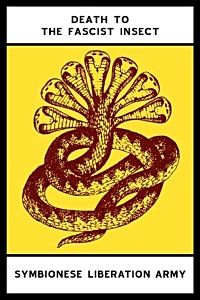 Founded by escaped convict Donald DeFreeze, aka Field Marshal Cinque, the SLA was mostly composed of young, largely white and middle-class men and women, whose stated aim was to destroy all forms of racism, sexism, and capitalism. One of the SLA’s first acts was the murder of the Oakland superintendent of schools; SLA members went on to kidnap newspaper heiress Patricia Hearst, demand millions of dollars from her wealthy family for free food for “people in need,” and rob a bank in San Francisco with Hearst. Most of the SLA, including DeFreeze, died in a fire after a gun battle with police in Los Angeles, while Hearst was later pardoned.
Founded by escaped convict Donald DeFreeze, aka Field Marshal Cinque, the SLA was mostly composed of young, largely white and middle-class men and women, whose stated aim was to destroy all forms of racism, sexism, and capitalism. One of the SLA’s first acts was the murder of the Oakland superintendent of schools; SLA members went on to kidnap newspaper heiress Patricia Hearst, demand millions of dollars from her wealthy family for free food for “people in need,” and rob a bank in San Francisco with Hearst. Most of the SLA, including DeFreeze, died in a fire after a gun battle with police in Los Angeles, while Hearst was later pardoned.
This publication features an introduction by editor John Brian King, a chronology of the SLA, the writings and transcribed recordings of the group presented in the context of events at the time, and a fifty-page appendix of notable articles, letters, and other texts related to the SLA.
John Brian King is a writer, photographer, and filmmaker. His works include the nonfiction book Lustmord: The Writings and Artifacts of Murderers (1997), the photography books LAX: Photographs of Los Angeles 1980-84 (2015) and Nude Reagan (2016), and the feature film Redlands (2014).
Death to the Fascist Insect
John Brian King, Editor
Publisher: Spurl Editions
Product Number: 9781943679089
ISBN 978-1-943679-08-9
SKU #: C17B
Binding: Paperback
Pages: 232
Literary Nonfiction
California Interest
African & African American Studies
Political Theory. Crime
Price: $ 18.50
Pub Date: 3/13/2019
# New books
SLA – Symbionese Liberation Army
Death to the Fascist Insect
• fleursdumal.nl magazine
More in: - Book News, - Bookstores, Archive K-L, Art & Literature News, CRIME & PUNISHMENT, Racism
La linguiste Marie Treps retrace l’histoire des insultes racistes dans Maudits mots.
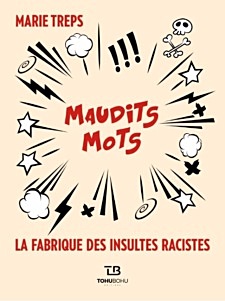 La linguiste effectue un inventaire des insultes racistes au fil du temps, à partir de citations issues de textes anciens ou contemporains. Elle retrace les circonstances historiques dans lesquelles elles ont été imaginées ainsi que les motivations.
La linguiste effectue un inventaire des insultes racistes au fil du temps, à partir de citations issues de textes anciens ou contemporains. Elle retrace les circonstances historiques dans lesquelles elles ont été imaginées ainsi que les motivations.
“Maudits” mots fournit un inventaire détaillé des termes et des expressions produits, au cours de notre histoire, par la xénophobie ordinaire ou par le racisme exacerbé.
Marie Treps dissèque les multiples insultes adressées aux Allemands, aux Arabes, aux Asiatiques, aux Espagnols, aux Italiens, aux Juifs, et à bien d’autres groupes ainsi réduits à l’état de stéréotypes, voire déshumanisés.
En linguiste et en sémiologue, Marie Treps ausculte tout un lexique qui vise à dégrader, à stigmatiser, à outrager, qui est parfois naïf, faussement affectueux, ou qui se donne une apparence scientifique. L’analyse s’appuie sur des textes anciens et contemporains, dont beaucoup appartiennent à la littérature.
Linguiste et sémiologue, Marie TREPS a publié une quinzaine d’ouvrages consacrés à la langue française, notamment, Les Mots voyageurs, Seuil, 2003 ; Les Mots migrateurs, Seuil, 2009 ; Les Mots-caresses, CNRS Editions, 2011 ; Oh là là, ces Français ! La Librairie Vuibert, 2015.
Marie Treps:
Maudits mots. La fabrique des insultes racistes
Broché: 327 pages
Editeur: Tohu-Bohu éditions
Collection: TOHU BOHU
Langue: Français
2017
ISBN : 978-2-37622-012-1
Dimensions: 15 x 20 cm
€ 20,00
# new books
Maudits mots.
La fabrique des insultes racistes
fleursdumal.nl magazine
More in: - Book News, - Book Stories, Archive S-T, Art & Literature News, CRIME & PUNISHMENT, MONTAIGNE, Racism
Thank you for reading Fleurs du Mal - magazine for art & literature